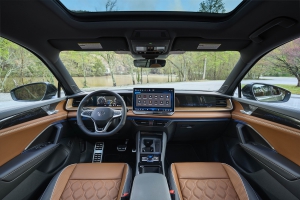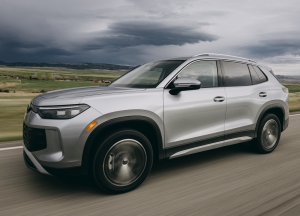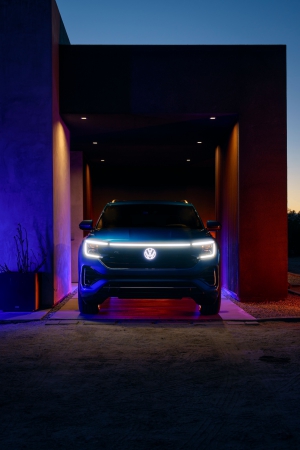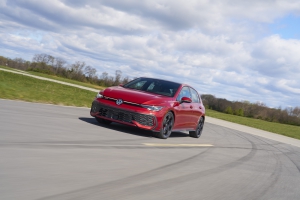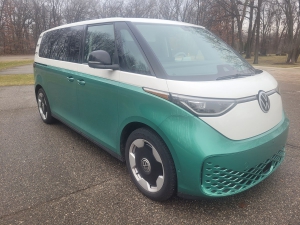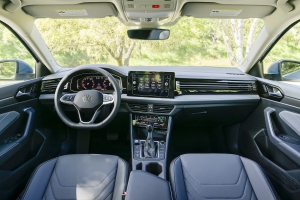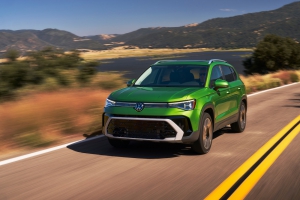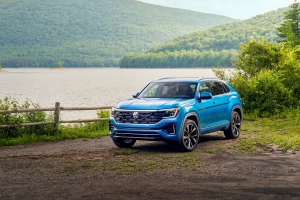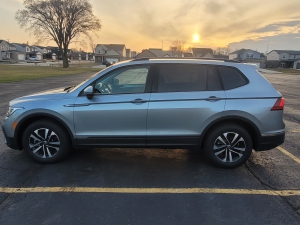2026 Volkswagen Tiguan delivers luxury vibes, powerful new motor
In the always competitive compact SUV segment (which includes such stalwarts as the Honda CR-V, Mazda CX-5, Toyota RAV4 and Nissan Rogue), you can never sit still and hope to compete.
With that in mind, Volkswagen has upgraded its Tiguan SUV for the 2026 model year by offering a powerful new turbo motor that should help its stature in the segment. This comes on the heels of an overall redesign of the Tiguan in 2025.
I recently tested the 2026 Volkswagen Tiguan (an SEL R-Line Turbo model), which featured all-wheel drive, and a spacious and upscale interior for five passengers.
Battling mostly against Asian-made counterparts, this Euro-flavored offering brings a unique competitor to this segment. Read on for my full review on how the Tiguan stacks up against its rivals.
Redesigned 2025 Volkswagen Tiguan gets impressive interior, exterior updates
Volkswagen’s lineup of SUVs are a bit unique among the competitors in the non-luxury SUV segment, as they bring a bit of European flair to battle the long list of Asian and U.S. entries in the segment.
I recently spent some time with one of these VW SUVs, the all-new 2025 Volkswagen Tiguan, which gets a full redesign for the new model year.
The Tiguan is VW’s most popular vehicle in the U.S., edging out the larger Atlas, so maintaining interest in this vehicle is critical for the brand in this country.
Both the exterior and interior have been updated, and they added new technology setups and a more powerful engine. The Tiguan now comes standard with two rows across the board and no three-row option available, as it was in 2024 and prior years.
Read on to learn more about how the Tiguan holds up against other leading compact SUVs including the Honda CR-V, Hyundai Tucson, Kia Sportage, Ford Escape, and Toyota RAV4.
2025 Volkswagen Atlas Cross Sport is a sleek, stylish two-row SUV
In the competitive SUV landscape of 2025, automakers must offer a variety of choices to fit all customer needs.
So it makes sense that Volkswagen offers an alternate version of its three-row Atlas SUV, the Atlas Cross Sport, which features just two rows of seats with room for 5 passengers, and ditches the third row.
The Atlas Cross Sport, first introduced for 2020, is aimed at car buyers who want a snazzier exterior design, and don't need room for more than 5 people in their vehicle.
I recently tested a 2025 Volkswagen Atlas Cross Sport, and I’m back with a full report on how it holds up against key competitors such as the Honda Passport, Jeep Grand Cherokee and Mazda CX-70.
2025 Volkswagen Golf GTI remains a star in the hot hatch category
The “hot hatch” category may not be the best-selling type of vehicle in this SUV world we live in, but it’s a segment where many drivers are truly invested and want to keep alive.
These sporty little cars are performance-oriented hatchbacks with fun-to-drive personalities, focused less on transporting the family and cargo space, and more on pure enjoyment of the drive itself.
One of the longtime greats in the hot hatch segment is the Golf GTI, and I recently spent some time behind the wheel of a 2025 Volkswagen Golf GTI Autobahn model. The latest version of the Golf GTI loses its manual transmission option, but still delivers a performance that driving enthusiasts will love.
Technology gets updated with mixed results, but no one can deny the driving experience in the new Golf GTI, which should continue to have its share of fans.
Read on for a full breakdown of how the 2025 Golf GTI holds up vs. other hot hatch competitors — including the Toyota GR Corolla, Honda Civic Type R, and more.
2025 Volkswagen Taos is a spacious compact SUV option
As Volkswagen continues its efforts to grow market share in the SUV segment, it has made some updates to the 2025 edition of the smallest member of the family — the Volkswagen Taos.
This little SUV isn’t going to sit idly by while others in the segment make upgrades. WIth the 2025 Taos, Volkswagen has decided to add additional horsepower to the engine, as well as some style updates to both the exterior and interior of the vehicle, plus a larger infotainment screen.
I recently tested a 2025 Volkswagen Taos SE Black model, and I’m back with a full report on how the vehicle holds up vs. other compact SUVs — including offerings from Chevy (Trax), Mazda (CX-30), Buick (Envista) and Subaru (Crosstrek).
2025 Volkswagen ID.Buzz microbus delivers retro look in a modern EV package
If you think you’ve been hearing about the Volkswagen ID.Buzz for a while, you would be correct.
First unveiled as a concept vehicle at the 2017 North American International Auto Show, it is finally available for sale in the U.S. after a long journey and first debuting in Europe.
First things first, what exactly is the ID.Buzz?
Is it a microbus? A minivan?
Whatever you want to call it, this nostalgia-inspired offering harkens back to VW’s 1960s microbus heritage (the kind you might have taken to Woodstock). Brought into the present, it is a wholly unique entry in the U.S. automotive landscape. There are just a few large fully electric SUVs that can be considered competition (Kia EV9, Hyundai Ioniq 9, Rivian R1S), and some minivans that are offered in hybrid versions that could be cross-shopped, but none of the alternatives are in the exact class of the ID.Buzz — it’s truly its own category in many ways.
Doubters will be tempted to write off the ID.Buzz as a trendy offering, but there is plenty of capability and versatility offered by the vehicle that should silence them. It’s got plenty of power, lots of cargo space and room for 7 passengers, and a versatile design to accommodate various needs.
I recently got some time behind the wheel of this long-awaited VW revival, driving a 2025 Volkswagen ID.Buzz Pro S Plus, and I’m back with a full report for all who may be interested in taking one home.
2025 Volkswagen Jetta is a capable, affordable sedan
While other brands are bowing out of the sedan market to focus on SUVs, Volkswagen isn’t quite throwing in the towel.
For the 2025 model year, they continue to offer the Volkswagen Jetta, a budget-friendly compact sedan offering attractive styling and strong fuel efficiency.
Offered for the past 35 years, the Jetta is VW’s only remaining sedan, and gets a refreshed look on both the front and rear ends for 2025, but not a full redesign.
I recently tested a 2025 Volkswagen Jetta (SEL trim level), and I’m back with a full report on how it holds up against compact sedan offerings from Honda, Toyota, Hyundai, Mazda and more.
Volkswagen reveals updated 2025 version of Taos compact SUV
Volkswagen has announced the 2025 Taos SUV, which includes updated looks and technology. The refreshed 2025 Taos will reach U.S dealerships by the end of 2024 and pricing will be announced closer to launch.
In addition to revised exterior styling including a new bumper design, new grille with available light bar, standard LED projector headlights and new wheel designs, an expanded selection of paint options is available — including new colors Bright Moss Green, Monterey Blue Pearl, and Monument Gray.
2024 Volkswagen Atlas Cross Sport offers sharp styling, tech-savvy and upscale interior
With the demand for SUVs as high as it’s ever been, automakers are wise to cover all bases and offer additional models and vehicle styles to fit different buyers.
For Volkswagen, which already offers the Volkswagen Atlas three-row SUV, that means also having a shorter two-row version of the Atlas — dubbed the Atlas Cross Sport — for folks who need fewer seats and are seeking a sharper look.
There’s a ton of strong competitors in the midsize SUV segment (including Jeep Grand Cherokee, Honda Passport, and many others), so the Atlas Cross Sport must clear a high bar to make a significant impact.
New for 2024 is an updated engine (a four-cylinder engine that replaces the previous model’s V6 but adds power), and some styling updates and additional standard tech features.
I recently spent some time in a 2024 Volkswagen Atlas Cross Sport SEL R-Line, a midsize SUV which catches your eye with its attractive, sloping roofline, and I’m back with a full report on this stylish ride.
2024 Volkswagen Tiguan is a roomy, fuel-efficient SUV option
A global giant, Volkswagen continues to make its best effort to find its place in the SUV market in the United States.
One of their key offerings is the Tiguan, which slots in the middle of its SUV lineup between the smaller VW Taos and larger VW Atlas/Atlas Cross Sport options. It’s the highest-selling vehicle for Volkswagen in the U.S., with more than 71,000 Tiguans sold in 2023.
It’s competing with some strong vehicles, including Toyota RAV4, Kia Sportage, Honda CR-V, Nissan Rogue, Chevy Equinox, Ford Escape, Mazda’s CX-5 and CX-50, and more.
Standing out is tough in this segment, but VW pulls a bit of a wild card by offering the Tiguan with a third row, a feature most of the alternatives do not offer.
There are no major changes for 2024, as the main changes for the 2024 model are additional features becoming standard on lower trim levels. (Note: A completely new design is anticipated for the 2025 model year.)
I recently spent time behind the wheel of a base model 2024 Tiguan, and I’m back with a full report on how it holds up in today’s SUV landscape.
News Categories
Popular Tags
Search Reviews by Make

AutoTechReviews is your home for In-depth reviews of the latest cars, trucks, and SUVs; information on all the emerging vehicle technology; and breaking news from the world of NASCAR and other motorsports.
